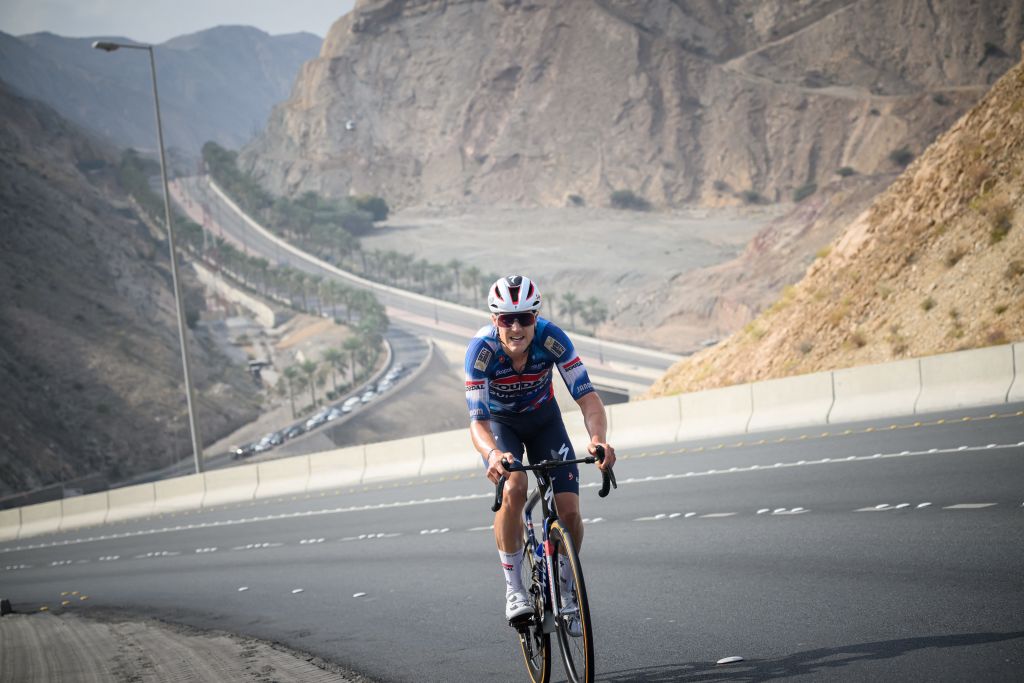Vervaeke says 'boredom' extra motivator for success in Tour of Oman stage victory
Belgian clinched first pro win after 140km breakaway on stage 2

Tour of Oman stage 2 winner Louis Vervaeke's dislike of boring stages provided extra motivation for his decision to get in a 140km breakaway this weekend – one that led to his dramatic first-ever professional victory with the peloton snapping at his heels.
The Soudal-QuickStep pro captured the victory and the overall lead thanks to his ultra-long distance breakaway, which began when the 31-year-old bridged across with Xabier Azparren (Q36.5) to an early move of five.
By the end of the stage, Vervaeke was the only survivor out there from the move, attacking over the Al-Jissah ascent in the final 10km to remain clear and claim victory by the narrowest of margins. In a sport where successful breakaways are increasingly hard to pull off, Vervaeke had achieved the near-impossible.
But as Wielerflits reported, a dislike of encroaching tedium during races was one of the factors that made the Soudal-QuickStep domestique feel he ought to get out there and give it a go.
"I have to admit that at the start of the stage I was in the peloton and I thought 'This is going to be a really boring day'," Vervaeke told the Dutch website. "I really didn't feel like it. In stage 1, on Saturday, I was also bored to death."
Vervaeke said it wasn't the first time in a Middle East stage race where he'd found himself doing the cycling equivalent of twiddling his thumbs and "sometimes counting down the kilometres. You don't see that very often in [races in] Europe, but I still wanted to make it a nice day."
Cue one day-long break, and although Vervaeke admitted the thought he might be on a hiding to nothing crossed his mind, he opted to go on the attack whatever.
Get The Leadout Newsletter
The latest race content, interviews, features, reviews and expert buying guides, direct to your inbox!
After a couple of efforts went nowhere, when Azparren – "who was incredibly strong" – joined him, his hopes for success increased a lot. Then "when we managed to close the gap and went to a difference of seven minutes, I knew that something was possible.”
Vervaeke said he always knew that it would be close, but that his determination to succeed remained intact all the way to the line. As he put it to Wielerflits "I just saw the finish line and knew: that's where I have to go."
The Belgian recognised these kinds of wins are increasingly unusual in modern cycling because "everything is so controlled. In fact, these are normally boring stages, a small breakaway rides away and then nothing happens the whole day."
"We have often said to each other that we waste too many days, that more is possible than we think. Only one team can win. If you don't have the team with which you are certain to win the stage, you just have to try something.”
Vervaeke's subsequent spell in the overall lead only lasted 24 hours, dropping behind on the final ascent of stage 3 with around three kilometres to go and crossing the line behind the day's winner, David Gaudu (Groupama-FDJ) at 3:54 back. But his spectacular lone breakaway to his first-ever pro triumph will linger much longer in the memory, all the same.
Alasdair Fotheringham has been reporting on cycling since 1991. He has covered every Tour de France since 1992 bar one, as well as numerous other bike races of all shapes and sizes, ranging from the Olympic Games in 2008 to the now sadly defunct Subida a Urkiola hill climb in Spain. As well as working for Cyclingnews, he has also written for The Independent, The Guardian, ProCycling, The Express and Reuters.
